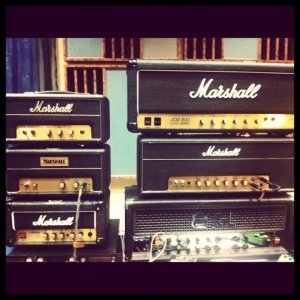Re: Volume when recording guitar tracks
-3 to -6dbFS is incredibly loud if you are recording 24 bit (and you should be) and not necessary. You will have to do a lot of gain reduction after the fact. It's better to record into your daw at a more sane level so that your faders can be set to zero and you essentially have a a rough mix without having to apply much gain reduction.
Why is that better?
I record each track at about -14dBFS. With a full mix, it will still require buses to be gain reduced to avoid clipping plugins and keeping the 2-bus at a sane level.
That's a valid personal preference I suppose. But most of us are recording digitally. It's no difficulty at all to gain reduce different channels by any amount. Every track should have an easy to adjust slider.
This is not best practice for recordings of any sort!
Could be. I'm just a guy in my basement with some mics. Why is it not a best practice?
If you are observing a good signal:noise ratio, changing the gain of the recorded track has no bearing the noise floor. It is also unrelated to recording level.
This is not true, and is easily demonstrated. Even with the best quality equipment, if you record something at -50 dB and then boost the recorded track by 40 dB, your noise floor (and the quality of your recording) will be much lower than if you record something at -14 and boost the track by 10 dB. Please, take a couple minutes and try. It's not subtle at all.
When recording in 24bit it is better to record at a nominal level of -14 to -11dBFS per track. The bit depth is sufficient enough where there will be none of the stepping associated with 16 bit recordings, which need to be tracked a little louder to compensate for crappy converters and digital aliasing.
You've stated this preference for -14, and it may well be right. Can you explain why this is objectively better than recording to -15, -10, -5, -3, or any other particular value?
(FWIW, the first recordings I ever made on my computer were 16 bit with crappy converters as that's all that the audio interface I had in the early '00s was capable of. It's certainly possible that I've picked up habits from working with that that aren't applicable any more.)
When people were recording to tape you needed a much hotter signal because of the loss you got from multiple playbacks; also, those values are based off of ANALOG VOLTAGES in dBu, not DIGITAL FULL SCALE, which is 14dB hotter than analog.
I've never recorded anything to tape, and have always gone by the dB value on the DAW that is being used. Good to know that there are different dB values in the off chance I ever use analog equipment for recording though.
This is also not best practice.
As mentioned, I'm just a guy in a basement with some mics, everything I'm doing may well be wrong. Could you tell me why this isn't a best practice?
I mean, you can record any way you like, but stating personal preference as recording and mixing advice is not very helpful.
You can correct me if I'm wrong, but much of music production isn't really a defined science with 'right' and 'wrong' answers. To a certain extent, all recording and mixing advice is personal preference is it not?
Sorry if this is coming across as harsh, it's totally not meant that way. But your advice is not good or helpful and leads to the development of bad habits.
If I'm doing something horribly wrong, I'd love to learn to do it better. Simply saying that what has been working for me is wrong and my advice isn't good doesn't really help though. If you can explain what bad habits are developed and the reason why these are considered bad habits I'd appreciate it (and could learn from it).

